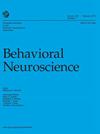Modeling impaired insight after drug use in rodents.
IF 1.5
4区 医学
Q3 BEHAVIORAL SCIENCES
引用次数: 0
Abstract
Impaired insight in substance use disorder has been argued to reflect a global deficit in using cognitive models to mentally simulate possible future outcomes. The process of mentally simulating outcomes allows us to understand our beliefs about their causes, that is, to have insight and thereby avoid potentially negative outcomes. However, work in humans cannot address whether impaired insight and its neural/neurochemical sequalae are present prior to the development of a substance use disorder, a consequence of substance use, or a combination of both. This is because baseline measurements prior to drug use are not possible in humans. However, if these changes can be directly caused by drug use, then in animal models, a history of drug use should cause impairments in behavioral tasks designed to assess such inferences. Focusing on cocaine use, here we will review several lines of research from our laboratory that have tested this question using learning-theory tasks designed to isolate insight. (PsycInfo Database Record (c) 2024 APA, all rights reserved).啮齿动物吸毒后洞察力受损的模型。
有人认为,药物使用障碍患者的洞察力受损,反映了他们在使用认知模型对未来可能出现的结果进行心理模拟方面存在全面缺陷。心理模拟结果的过程使我们能够理解自己对其原因的信念,即洞察力,从而避免潜在的负面结果。然而,在人类身上进行的研究无法解决洞察力受损及其神经/神经化学后果是在药物使用障碍发生之前就已存在,还是药物使用的结果,或是两者兼而有之。这是因为在人类身上不可能进行药物使用前的基线测量。但是,如果这些变化是由药物使用直接引起的,那么在动物模型中,药物使用史应该会导致用于评估此类推断的行为任务出现障碍。在此,我们将以可卡因的使用为重点,回顾我们实验室利用旨在分离洞察力的学习理论任务对这一问题进行测试的几项研究。(PsycInfo Database Record (c) 2024 APA,保留所有权利)。
本文章由计算机程序翻译,如有差异,请以英文原文为准。
求助全文
约1分钟内获得全文
求助全文
来源期刊

Behavioral neuroscience
医学-行为科学
CiteScore
3.40
自引率
0.00%
发文量
51
审稿时长
6-12 weeks
期刊介绍:
Behavioral Neuroscience publishes original research articles as well as reviews in the broad field of the neural bases of behavior.
 求助内容:
求助内容: 应助结果提醒方式:
应助结果提醒方式:


